
Dr James W.E. Smith
Laughton-Corbett Research Fellow
Biography
James was awarded his PhD in ‘War and Strategic Studies’ in 2021 from the Department of War Studies, King’s College London. He is appointed the Laughton-Corbett Research Fellow, a title and fellowship created explicitly by King’s and authorised by the Dean of Research, to support his research projects and his role in lecturing and supporting the development of PGT and PGR civilian and military students.
You can find out more and follow James on his substack.
Laughton-Corbett Research Fellow
The Laughton-Corbett Research Fellow educates and encourages the use of the historical methodology––the analysis of experience––to offer insight into past, present and future debate and discussion on strategy, war studies, military history, policy, defence, security, geopolitics, geostrategy, international relations and more with an emphasis on practical, functional, impactful outputs, while also focusing on advancing research into strategic studies and its influence on the world today and tomorrow. There is particular emphasis on the evolution and development of strategic theory.
The fellowship is named after Royal Navy Captain Sir John Knox Laughton (1830-1915), one of the founding fathers of military history, including naval history and the use of historical analysis to guide future discussion on defence and security. Civilian Sir Julian Corbett (1852-1922) was one of the world’s leading strategists and strategic theorists covering naval and maritime strategy and broader national strategy and policy.
PhD and Post-Doctoral Research
James’s PhD examined the relationship between the higher organisation of defence and the development of national strategy-making in the UK and the US from ‘seabed to space’. The core theme of developing strategy, practically and theoretically, including national ways of ‘war and peace’ and the interface between organisation, national policy and national strategy continues post-doctoral. Beyond working on multiple future publications, James is engaged in various journal outputs and engagements, such as podcasts, magazines, media, and blogs.
The British Academy supports the Laughton-Corbett Fellowship, including his project to advance maritime strategy as the foundation of space strategy and disseminate his work on defence reform covering organisation, strategy and policy to a broader audience.
James is a U.S. Naval War College Fellow, Royal Historical Society and Royal Astronomical Society. In the UK and US, he is an active member of groups such as the American Astronomical Society, British Interplanetary Society, The Planetary Society and National Space Society and military history associations such as the 1805 Club and Naval Records Society.
James actively contributes to the various research groups, centres and themes at King's. He continues to be a founding member of the Wargaming Network, which aims to advance the theory and application of wargaming as a method of inquiry and as a method of learning and teaching. He is also engaged in various professional organisations, projects, associations and research groups in the UK, USA, Australia and Japan. One of these projects is the international ‘Corbett 100 project’ that James pioneered and marks the centenary of the death of historian, strategist, and philosopher of seapower and maritime strategy Sir Julian Corbett.
Research interests
- The development of strategy, strategic thought, strategic theory, the art of war (Major/Minor Inc. Applied History), strategic policy and doctrine
- National Ways of ‘War and Peace’
- The theory, development and practice of maritime strategy
- National Strategy, National Defence Strategy, National Security Strategy
- Strategic Space Theory, Space Warfare, ‘Astropolitics’ and ‘Astrostrategy’ (Incl. Geostrategy and Geopolitics), Defence Space Policy, Space History, Human activity in space near-Earth and beyond (outer and deep)
- Future development of humanity as a spacefaring civilisation
- Defence Organisation: American Defense Unification (DoD) and British Defence Unification (MoD), such as higher organisation, organisational and strategic culture, jointness, command and control, and civil-military relations
- Wargaming: advancing research into the ‘art and philosophy’ of wargaming, including the development, theory, and practice of wargaming
- Contemporary British and American Defence Policy, Strategy and History
- Contemporary Naval and Maritime History and Naval Warfare: Sea Power, Maritime Power, and Naval Power
- Naval Wargaming: history, theory, and practice
Selected Outputs and Publications
- Forthcoming Monograph on ‘Space Strategy’ (1st Ed.).
- Forthcoming Monograph on UK and US Defence unification and defence reform and its relationship with strategy-making.
- 'Navies are Our Guide for Space Strategy', Centre for Maritime Strategy, 2025.
- Forthcoming Monograph on the Royal Navy, British Way of War, Defence Reform and National Strategy.
- The Foundations of Space Strategy: The Admiralty, U.S. Navy and Maritime Influences, A New History. USNA/USNWC/USNI Press (2023).
- Press Release: New project will use a maritime approach to advance space strategy
- Public Lecture: The Creation of the U.K. Ministry of Defence & the U.S. Department of Defense: Power, Politics and Agenda. A New History. King’s College London (2022).
- King’s Annual Research Impact Report 2024: ‘Ensuring Security From Seabed to Space’.
- ‘The Art of Admiralty, Maritime Strategy, and the Island Nations: Britain, Australia, and Japan’ (Sept 2023). Australian Naval Institute and the Australian Naval Review (2024).
- Event: From National Strategy to Strategy in Policy: The Evolution of Strategy and Strategic thought and the Interface with Policymaking (2022).
- Smith, James W.E. “Seablindness, the Royal Navy and US Navy after 1964” The Naval Review Journal, March 2024.
- James W.E. Smith (2023), Battle for space: statecraft, diplomacy and defence strategy | Astronomy & Geophysics | Oxford Academic (oup.com), Royal Astronomical Society A&G, 64:2, 2.38–2.40, DOI: https://doi.org/10.1093/astrogeo/atad012
- Lecture: Defense Unification, the U.S. Navy and the Space Race 1957-1970: Expressions of US Sea Power in the Cold War. USNA/USNWC (2021).
- Keynote Lecture: The Art and Philosophy of Wargaming in the 21st Century? Revisiting fundamental questions of the past, present, and future nature and character of wargaming, A Strategic Studies and History Perspective. King’s College London, Wargaming Week Keynote, 1 June 2023.
- Smith, James W.E. “The Art of Admiralty”, The Naval Review Journal, 2023.
- Smith, James W.E. “Corbett offers more on Space than Mitchell.” War on the Rocks, 11 Dec. 2019.
- Smith, James W.E. “Space Force Creation Warrants Revisiting Defence Unification.” War on the Rocks, 23 Sept. 2020
- Press Release: King's College London led research collaboration enhances 'AUKUS' partnership between U.K., USA and Australia (kcl.ac.uk)
- Press Release: Security Studies hosts international conference on maritime strategist Sir Julian Corbett
- James W.E. Smith (2021) New Research into the History, Theory and Practice of Naval Wargaming, The Mariner's Mirror, 107:1, 100-103, DOI: 10.1080/00253359.2021.1845516.
- Recovering the Useful Past: Naval Historians at the Fore, Churchill College Cambridge, University of Cambridge. (25 Nov. 2022.)
- Falklands 40: War and Defence Studies Perspectives in the 21st Century led by Dr James W.E. Smith
- Forgetting Corbett: The Decline of Historically-led Methodology and Maritime Influences on Strategy in the Contemporary Era – 2022 School of Security Studies Research Conference “Back to the Future? Continuity and Change in the study of War and Conflict.
Research

Laughton Naval History and Maritime Strategy Unit
A Home for British naval and maritime thinking, research into global naval history and the study of seapower and maritime strateg. The Laughton Unit provides the ideal basis for original and challenging research on all aspects of naval history, seapower, sea power studies and maritime strategy, preparing the next generation of thinkers from all around the world, ready and able, for a spectrum of career possibilities and destinations.

The Art & Philosophy of Space Strategy
The Art and Philosophy of Space Strategy is a multi-year joint British Academy, King’s College London supported research project.
Project status: Ongoing

Wargaming Network
The Wargaming Network aims to advance the theory and application of wargaming as a method of inquiry and as a method of learning and teaching.
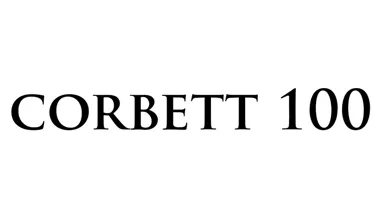
Corbett 100
Corbett 100 marks the centenary of the death of historian, philosopher of seapower and maritime strategist Sir Julian Corbett (1854-1922).
Project status: Ongoing

Space Security Research Group
To promote research in a wide variety of space-related security issues.

Naval Wargaming Research
The group regenerates research into the study and practice of wargaming for naval and maritime research, historical research and use as an educational tool.
Project status: Ongoing
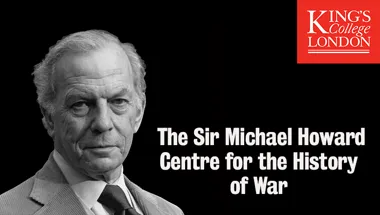
Sir Michael Howard Centre for the History of War
The centre promotes the scholarly history of war in all it's dimensions, trains research students and hosts research projects and conferences

Centre for Statecraft and National Security
A leading academic institution in the heart of London, we are focused on the past, present, and future of statecraft, national security, and international order.
News
New project will use maritime approach to advance space strategy
A new project supported by the Laughton Unit in the School of Security Studies aims to use maritime strategy to advance understanding of the role of space in...

U.S Naval War College hosts conference with King's on defence and security challenges
Academics from the School of Security Studies in partnership with the U.S Naval War College and Australian Naval Institute, discussed historical questions,...
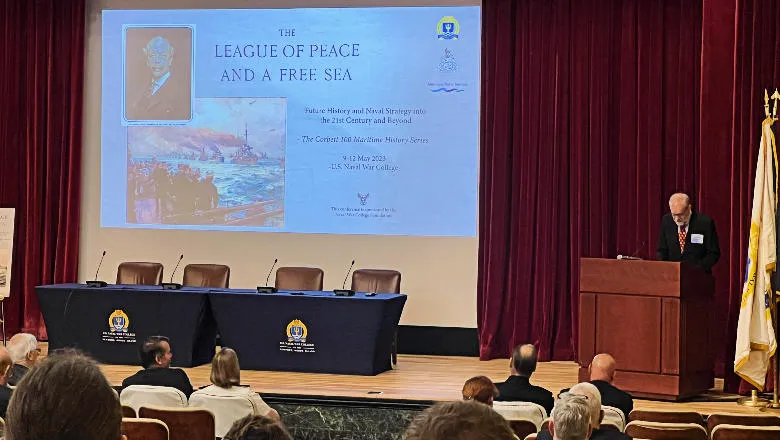
Security Studies hosts international conference on maritime strategist Sir Julian Corbett
The Corbett 100 Conference explored the life and times of the important historian and strategist
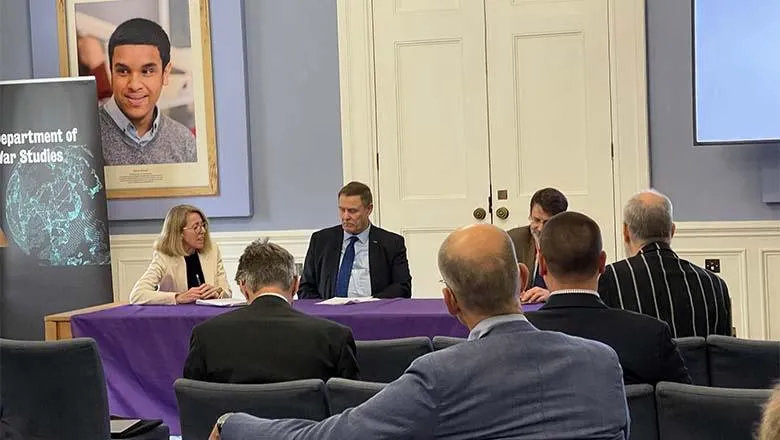
King's College London led research collaboration enhances 'AUKUS' partnership between UK, USA and Australia
A collaborative project by the Laughton Naval Unit with research partners in the USA and Australia supports the close ties identified in the new ‘AUKUS’...
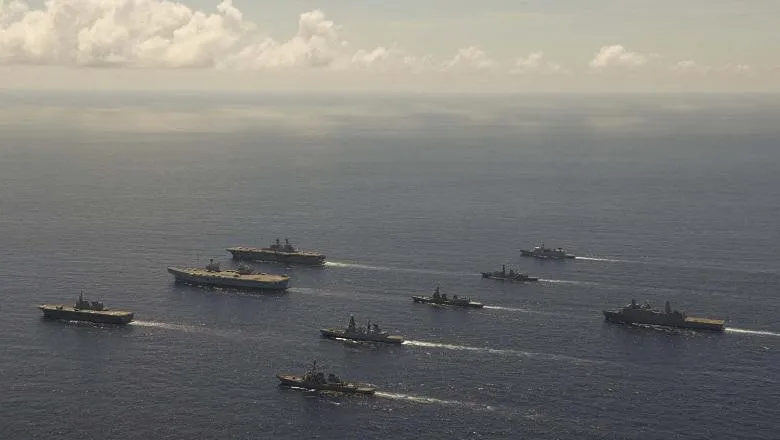
Events

The Challenges for Space Strategy
Join Dr James Smith and Dr John Klein for an engaging online lecture on the future of space strategy, exploring the challenges of space warfare, geopolitics...
Please note: this event has passed.

Corbett 100: Naval Strategy in the 21st Century: From Seabed to Space
This naval strategy seminar sees scholars from the UK, US, France, Australia, Japan and the Netherlands look to the future of Naval Strategy.
Please note: this event has passed.
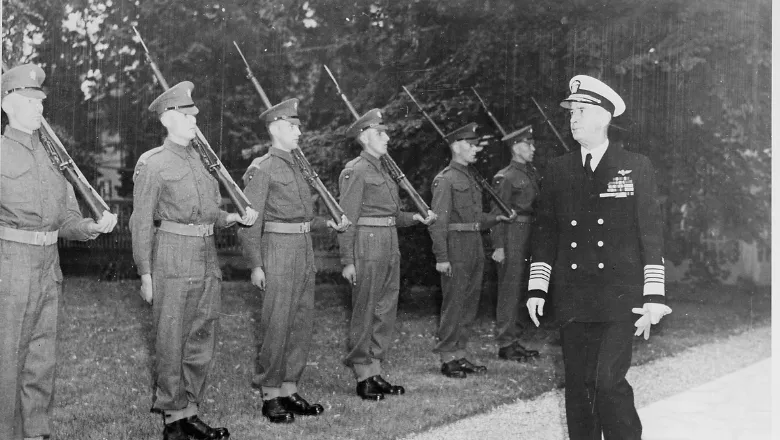
King’s Navy: Fleet Admiral Ernest J. King and the Rise of American Sea Power, 1897-1947
Join Dr. David Kohnen for the launch of King’s Navy, an authoritative look at Fleet Admiral Ernest J. King and the rise of American sea power from 1897 to 1947.
Please note: this event has passed.

Space Warfare 2.0
Get insight into the future of space warfare! Join Dr. James WE Smith and Dr. John Klein for a discussion on strategies from Space Warfare 2nd Edition.
Please note: this event has passed.

King's NATO ACT Wargaming Week 2024
The Wargaming Network is pleased to invite you to join the Wargaming Week 2024 in partnership with NATO ACT.
Please note: this event has passed.

Space power and Irregular Warfare in Space
Join Dr John Klein's presentation on the theory of space power, followed by a Q&A session.
Please note: this event has passed.

Astrostrategy to National Strategy: utilising the maritime strategic way of thinking
Dr James Smith explores how, in the 21st century and beyond, maritime strategic ways of thinking can help guide strategists, theorists and policymakers alike.
Please note: this event has passed.
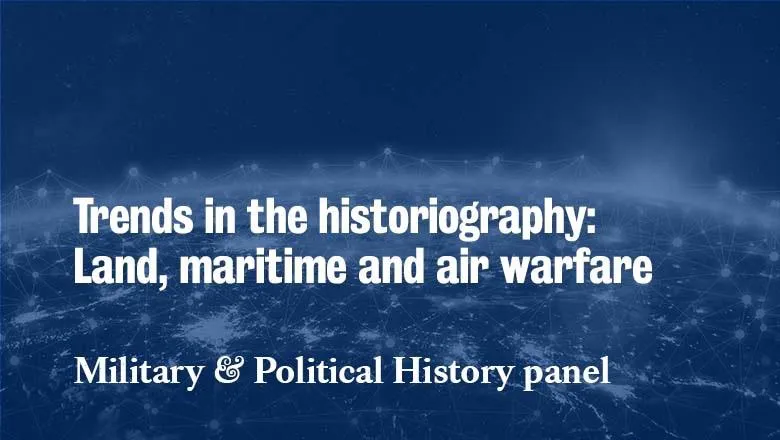
Trends in the historiography: Land, maritime and air warfare
Military & Political History panel for the School of Security Studies Research Conference 2022
Please note: this event has passed.
Features
The Future of Defence Organisation Resurfaces?
How defence is organised is fundamental in enabling or hindering national policy and strategy in peace and wartime. Equally, the organisation of defence...

A Future for British Seapower and the Royal Navy?
Dr James WE Smith, as the Laughton-Research Corbett Research Fellow, examines the evolving role of navies, particularly the Royal Navy, in the modern era of...

Education and Understanding: The Strategy for Sea and Space
The 2024 King’s Impact Report features British Academy supported Dr James WE Smith’s research that focuses on advancing education and understanding of...

From Neptune to the Final Frontier: A maritime renaissance
Dr James WE Smith discusses how thinking about the world around us and beyond in maritime strategic terms, from the seabed through to space, is going through...

Re-learning from Corbett: Applied History to the rescue of Strategic Thought
Corbett showed that developing credible, national strategy could only be achieved by objective engagement with the past.

Research

Laughton Naval History and Maritime Strategy Unit
A Home for British naval and maritime thinking, research into global naval history and the study of seapower and maritime strateg. The Laughton Unit provides the ideal basis for original and challenging research on all aspects of naval history, seapower, sea power studies and maritime strategy, preparing the next generation of thinkers from all around the world, ready and able, for a spectrum of career possibilities and destinations.

The Art & Philosophy of Space Strategy
The Art and Philosophy of Space Strategy is a multi-year joint British Academy, King’s College London supported research project.
Project status: Ongoing

Wargaming Network
The Wargaming Network aims to advance the theory and application of wargaming as a method of inquiry and as a method of learning and teaching.

Corbett 100
Corbett 100 marks the centenary of the death of historian, philosopher of seapower and maritime strategist Sir Julian Corbett (1854-1922).
Project status: Ongoing

Space Security Research Group
To promote research in a wide variety of space-related security issues.

Naval Wargaming Research
The group regenerates research into the study and practice of wargaming for naval and maritime research, historical research and use as an educational tool.
Project status: Ongoing

Sir Michael Howard Centre for the History of War
The centre promotes the scholarly history of war in all it's dimensions, trains research students and hosts research projects and conferences

Centre for Statecraft and National Security
A leading academic institution in the heart of London, we are focused on the past, present, and future of statecraft, national security, and international order.
News
New project will use maritime approach to advance space strategy
A new project supported by the Laughton Unit in the School of Security Studies aims to use maritime strategy to advance understanding of the role of space in...

U.S Naval War College hosts conference with King's on defence and security challenges
Academics from the School of Security Studies in partnership with the U.S Naval War College and Australian Naval Institute, discussed historical questions,...

Security Studies hosts international conference on maritime strategist Sir Julian Corbett
The Corbett 100 Conference explored the life and times of the important historian and strategist

King's College London led research collaboration enhances 'AUKUS' partnership between UK, USA and Australia
A collaborative project by the Laughton Naval Unit with research partners in the USA and Australia supports the close ties identified in the new ‘AUKUS’...

Events

The Challenges for Space Strategy
Join Dr James Smith and Dr John Klein for an engaging online lecture on the future of space strategy, exploring the challenges of space warfare, geopolitics...
Please note: this event has passed.

Corbett 100: Naval Strategy in the 21st Century: From Seabed to Space
This naval strategy seminar sees scholars from the UK, US, France, Australia, Japan and the Netherlands look to the future of Naval Strategy.
Please note: this event has passed.

King’s Navy: Fleet Admiral Ernest J. King and the Rise of American Sea Power, 1897-1947
Join Dr. David Kohnen for the launch of King’s Navy, an authoritative look at Fleet Admiral Ernest J. King and the rise of American sea power from 1897 to 1947.
Please note: this event has passed.

Space Warfare 2.0
Get insight into the future of space warfare! Join Dr. James WE Smith and Dr. John Klein for a discussion on strategies from Space Warfare 2nd Edition.
Please note: this event has passed.

King's NATO ACT Wargaming Week 2024
The Wargaming Network is pleased to invite you to join the Wargaming Week 2024 in partnership with NATO ACT.
Please note: this event has passed.

Space power and Irregular Warfare in Space
Join Dr John Klein's presentation on the theory of space power, followed by a Q&A session.
Please note: this event has passed.

Astrostrategy to National Strategy: utilising the maritime strategic way of thinking
Dr James Smith explores how, in the 21st century and beyond, maritime strategic ways of thinking can help guide strategists, theorists and policymakers alike.
Please note: this event has passed.

Trends in the historiography: Land, maritime and air warfare
Military & Political History panel for the School of Security Studies Research Conference 2022
Please note: this event has passed.
Features
The Future of Defence Organisation Resurfaces?
How defence is organised is fundamental in enabling or hindering national policy and strategy in peace and wartime. Equally, the organisation of defence...

A Future for British Seapower and the Royal Navy?
Dr James WE Smith, as the Laughton-Research Corbett Research Fellow, examines the evolving role of navies, particularly the Royal Navy, in the modern era of...

Education and Understanding: The Strategy for Sea and Space
The 2024 King’s Impact Report features British Academy supported Dr James WE Smith’s research that focuses on advancing education and understanding of...

From Neptune to the Final Frontier: A maritime renaissance
Dr James WE Smith discusses how thinking about the world around us and beyond in maritime strategic terms, from the seabed through to space, is going through...

Re-learning from Corbett: Applied History to the rescue of Strategic Thought
Corbett showed that developing credible, national strategy could only be achieved by objective engagement with the past.

